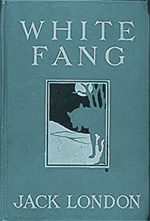
I’m about 3/4 through the novel White Fang by Jack London. I never had given much thought about this late 19th / early 20th century American writer other than in the context of forgotten, lesser ‘classics.’ I was flabbergasted when I began reading it. His writing style in this novel is excellent: deft, incisive, evocative, eloquent, rarely overwrought. Some of the sentences are some of the finest I’ve read in American literature...
The plot is excellent. It’s essentially a bildungsroman about a wolf (actually a 3/4 wolf, 1/4 wild dog mix) from the wolf’s (or kindred animals’) point of view, told mostly in a limited 3rd person narrative which allows one to feel both the wolf’s perspective, as well as the wider worldly karmic and at times even ‘metaphysical’ context, which begins with the wolf’s parents years before he is born…
The plotting of the first section is rather ingenious in that it doesn’t even hint that the book will be a bildungsroman, but begins with two sled-men in the remote Yukon, portrayed almost as a remote planet, during a famine in the wilderness, hired to bring back the body of a wealthy businessman’s wannabe adventurer son who recklessly traveled and froze to death there, way overschedule and running out of rations and energy, as they are aped by a pack of wolves that each night, in spite of their best efforts, kill some of of their sled dogs. The denouement in this section is exceptional…
London’s psychological understanding of wolves and wild dogs is amazing. Surely there are probably some inaccuracies here and there, but overall it seems to be unparalleled. It’s as if he had been a wolf in a previous life. His knowledge of wildernesses and the life of the wild is also keen…
Sometimes he makes statements about animal instinct, heredity, and other biological impulses far beyond his time, merely by dint of intuition, which only recently have been gaining some credence and articulated scientifically (Epigenetics, for example). He also, sparingly, manages to make profound metaphysical observations. The first section in which he is describing the whiteness, vastness, inhospitality, and severeness of the arctic landscape is especially piquing…
The book of course does have some missteps, as all books do, some passages out of character, but overall I’m very surprised by how good it is and, per this, how little London is remembered today. I would assume it’s one of his best. Also get the sense that, interestingly enough, he may not actually have had a deep understanding of *human* psychology and relations. In this novel the human characters are perfectly serviceable and realistic, but their roles and interiors are secondary, exist mainly in service of showing the interiors and developments of the animal characters…
Anyway, highly recommended. A great (re)discovery.




Leave a Reply